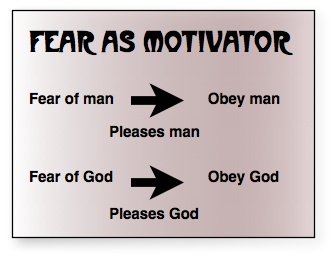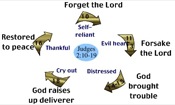
King Saul’s Disobedience & Demise
1 Samuel 15
The Bible Teaching Commentary
E. The Confession: Reveals his Superficial Heart
1 Samuel 15:24-31
Paul J. Bucknell
Introductory | The Crisis (1 Samuel 15:1-3) | The Response (1 Samuel 15:4-9)
The Test (1 Samuel 15:10-15) | The Excuse (1 Samuel 15:16-23)
The Confession (1 Samuel 15:24-31) | The Future (1 Samuel 15:32-35)
Bible Study Questions | mp3 Podcast
Purpose
1 Samuel 15:24-31 The Confession: Reveals his Superficial Heart is part 6/7 of The Bible Teacher's Commentary on 1 Samuel 15 which shows how Saul did not repent but only gave two 'polite' confessions. Reflection on God's immutability is also included with reference to 1 Samuel 15:29.
“Then Saul said to Samuel, “I have sinned; I have indeed transgressed the command of the LORD and your words, because I feared the people and listened to their voice. “Now therefore, please pardon my sin and return with me, that I may worship the LORD” (But Samuel said to Saul, “I will not return with you; for you have rejected the word of the LORD, and the LORD has rejected you from being king over Israel” (And as Samuel turned to go, Saul seized the edge of his robe, and it tore. So Samuel said to him, “The LORD has torn the kingdom of Israel from you today, and has given it to your neighbor who is better than you. “And also the Glory of Israel will not lie or change His mind; for He is not a man that He should change His mind.”
Then he said, “I have sinned; but please honor me now before the elders of my people and before Israel, and go back with me, that I may worship the LORD your God.” So Samuel went back following Saul, and Saul worshiped the LORD” (1 Samuel 15:24-31).
Confessions are important. They can pave the path to reconciliation. Why was there no reconciliation here? Evidently Saul had not properly humbled himself.
Have you ever said, “Sorry,” but not really meant it? The confession was more a professional courtesy, polite gesture or convenient escape from what otherwise would be a rather unhappy situation.
 Check out our Digital Old Testament Library for a huge collection of resources on 1 Samuel and all of the Old Testament!
Check out our Digital Old Testament Library for a huge collection of resources on 1 Samuel and all of the Old Testament!
Notice Saul’s confession.
What did he confess? He reveals, with a bit of pressure from Samuel, that the people swayed him. He feared the people and obeyed their voice. Fear is a powerful force.
Now some would immediately object to Saul’s confession. They are thinking how this has nothing to do with sin, let alone one in which he would lose his kingdom.
 Fear, they reason, is a natural response. He simply could not help it. It is interesting, charged with rebellion, witchcraft, insubordination and iniquity, he simply speaks about how the people caused him to sin. This seems to be another chapter from the Garden of Eden with the shifting of blame away from oneself to others.
Fear, they reason, is a natural response. He simply could not help it. It is interesting, charged with rebellion, witchcraft, insubordination and iniquity, he simply speaks about how the people caused him to sin. This seems to be another chapter from the Garden of Eden with the shifting of blame away from oneself to others.
How was Saul’s confession taken? Accepted? No, not quite. Samuel rejected Saul’s request for him to accompany him. It appears that Saul accidentally ripped Saul’s robe which in turn became a prophetic sign that King Saul’s kingdom was going to be take from him and given to another. This incident serves as a backdrop of the next key figure in the Book of 1 Samuel.
Does God change?
Samuel brings up a strong set of words describing God’s unchanging character. Samuel wanted Saul to know that God was not going to budge on this issue.
“And also the Glory of Israel will not lie or change His mind; for He is not a man that He should change His mind” (1 Samuel 15:29).
Those alert to the scriptures will not quickly leave this passage before getting a better grasp on the person and nature of God’s unchangeableness. What does 1 Samuel 15:29 really say about God or was it merely a quick statement to wake King Saul up from his game? After all, the Lord does sometimes change His mind, doesn’t He? It does state that God ‘repents’ from some certain course of action.
“Perhaps they will listen and everyone will turn from his evil way, that I may repent of the calamity which I am planning to do to them because of the evil of their deeds” (Jeremiah 26:3).
God is all wise. He sees events in time from the perspective of eternity. He knows all things. God does not change one’s mind like a man. He does, however, speak and act in such a way that accommodates man’s puny mind. God’s statement to Saul simply meant that Saul was not going to change His mind about taking the kingship away from him. Saul didn’t seem to care which perhaps showed why God said He would not change His mind. It is because Saul reached a point of hardness. He was not going to change. He was okay just so he could play king for a while longer.
Verses like Jeremiah 26:3 do not state that God changes but only that God’s way of dealing with a people is dependent on how they deal with Him. God’s policies are all set. If man changes, God changes. But in a sense His policy never changes. God wants to pour out His grace but the people’s hardened hearts reveal a barrier in their relationship with the living God.
God’s ways of dealing with man are one and uniformed. He has revealed them to us. He works in people’s lives with the hope that they will turn to Him so that He can pour forth extra grace. Even for the hardened individual (Are you hardened?), He is wishing that we would change so that He could change His way of dealing with us. These verses do not depict an ugly God who wishes for our worse. Quite the opposite. He patiently waits for us to change.
When we focus on external matters we minimize internal ones.
In this case, the meaning was ever too evident. Saul was not to try to change God’s mind. God was set on this. Saul didn’t really care. He did not repent so to gain God’s favor. So what does Saul do instead? He seeks Samuel’s presence to present a sense of decor. Everything seemed great on the outward. A huge victory. A monument. But inwardly everything had fallen apart. Saul did not care (at least to the point that he would change).
Observations
-
At some points people really do not care whether they are close to God. They are so twisted by perverted ideas about God and self that they are ensnared in the devil’s ways. They are content to let God go just so they can keep up the parade before man.
-
Saul like us can change. He like us just do not want to.
-
Saul was caught up in the present affairs about how someone thought of him and never could get beyond that. The future bowed down to the present and so he could not make good long-term decisions.
-
Saul was too preoccupied with himself to be able to think about the welfare of the people. He did do some good things, but the way he did it ripped the best from himself and the people.
Continue -> The Future: Arrogance perpetuates problems (15:32-35)








